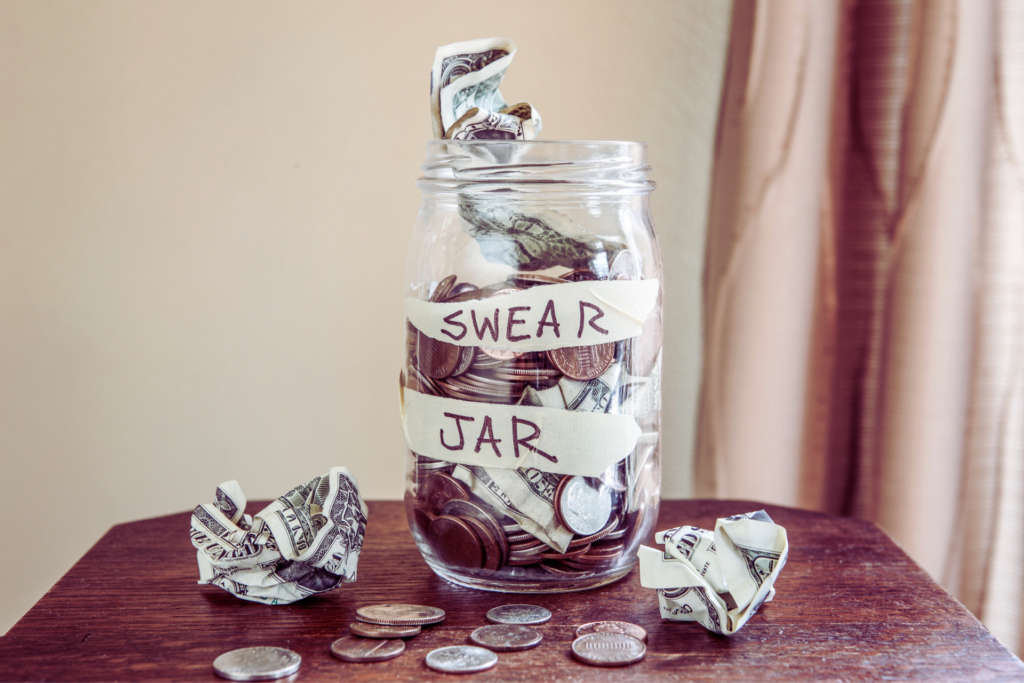Have you ever wondered how to stop cursing so much? Maybe you’ve tried but it hasn’t worked.
According to research, using bad language leaves a negative impression on others, even those who are not offended by profanity. This same research also found that people who swear are perceived as being unintelligent, untrustworthy, and less likable.
It’s common sense in most English-speaking cultures that learning how to stop swearing will make you come across as more respectable and intelligent, but how do you do it?
If you’ve spent the majority of your life using curse words, it can feel like that kind of language is just a part of who you are. But it isn’t, and there’s a way to clean up your language so your kids don’t go into the world talking like they’re from the prison block.
Look, we’ve all been there. You’re out in public with your kids and somebody cuts you off in traffic or you can’t find your keys and you let loose with a string of obscenities. It’s normal, right?
But then you turn to see your wide-eyed little sponge staring back at you in shock, and it suddenly dawns on you that they’ve just added some pretty creative expletives to their vocabulary. Oops.
Swearing is easy. Anyone can do it. But if you’re a parent, chances are you want to do everything you can to stop your kids from cursing.
After all, you don’t want them going around dropping F-bombs everywhere they go. And man, it happens sooner than you might think.
So here are a few tips to help you tame your inner sailor and help both you and your kids avoid four-letter words.
Lead by example.
It can be tough to keep a lid on your language sometimes, but it’s important to remember that children are always watching and listening. They learn by observing and imitating the adults in their lives, so if you want them to use respectful language, you need to set a good example.
When you do make a mistake, take responsibility for it and apologize. This will show your children that it’s possible to recover from setbacks without resorting to name-calling or swearing.
Take a timeout.
Timeouts aren’t just for kids—they can work for grownups, too. If you feel yourself losing control, walk away from the situation for a few minutes to take some deep breaths and calm down.
Around our house we call it being drunk on emotions. We say that because emotions can literally intoxicate you to the point where – if the emotions are high enough – you’ll say just about anything in the moment regardless of who’s listening.
Sometimes the only way to diffuse a situation and prevent your kids from learning harmful language is to remove yourself from the situation for a minute or two. And there’s nothing at all wrong with that.
If you can’t get away and all else fails, remember that nobody ever died from swallowing their pride. Sometimes the best thing you can do is apologize for your language and move on.
Encourage positive self-talk.
One of the best ways to avoid cursing is to model positive self-talk—encouraging statements we say to ourselves to stay motivated and focused—for your children.
For example, instead of yelling “I can’t believe I’m such an idiot!” when you make a mistake, try saying something like, “Hey, mistakes make me better.”
This simple change in perspective can help prevent negative self-talk from becoming a habit.
Talk to your kids about why swearing is bad.
I’ve always told my kids that cursing is something people say when they want to look or sound cool. Curse words are tribal – they’re mostly used to help us fit in.
Most curse words don’t mean anything inherently, they just make the person saying them come across a certain way to the listeners.
The bottom line is, you shouldn’t need to use curse words for people to like you, and if you feel the need to do so, you probably need a different circle of friends.
Have a talk with your kids about when it’s appropriate to curse and when it’s not.
Honestly, in our house we’re okay with some words that might be considered curse words. Words like “butt” or “butthole” aren’t necessarily banned as long as they’re used in a funny/appropriate way (according to our weird humor in our house) and as long as we’re not using them in a derogatory manner.
In other words, words should never be used to cut other people down no matter what word it is. As long as they’re not bringing people down and they’re not being downright crude, we’ll allow certain words like “crap” to fly.
However, there’s a big caveat to that. We know that our kids can say whatever they want when we’re not around, so we make sure they understand the way they use their words. We ask them why they feel the need to say certain words over others, and we educate them on how words determine how people see them.
It ends up being a pretty neat learning tool, but that’s the unspoken condition of the freedom of words in our house. And there are always boundaries to that freedom (they can never say “actual” curse words around us – not because they’re “forbidden” but because they know better words to use).
Remember: they’re always learning from you
Cursing may be easy, but that doesn’t mean it’s something you want your kids doing. It may seem like harmless fun sometimes, but it’s important to remember that children are always watching and listening.
Kids learn by observing and imitating the adults in their lives, so if you want them to use respectful language, you need to set a good example.
Luckily, with a little effort on your part, you can keep the family conversations G-rated for the foreseeable future.



